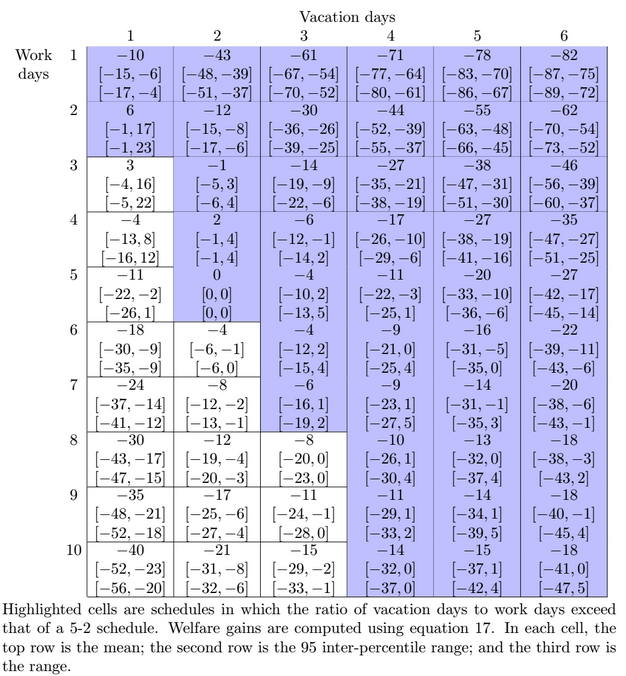Eight days a week, revisited
Posted on Thu 02 June 2016 in economics
If, as I investigated in a previous post, you were down with an eight-day week, then you were down with an idea that is possibly welfare improving. Give yourself a pat on the back.
That's according to Maya Eden in a paper elegantly titled The Week. Dr. Eden presented her work at a New York Fed seminar yesterday on this issue near and dear to my heart.
Eden's presentation of some of the background of the modern week included some joyfully quirky tidbits:
- Brunei today uses a 4-1-1-1 week (Friday and Sunday off) to accommodate the religious Muslim (day of rest on Friday) and Christian (Sunday) populations.
- Beginning in 1929, the Soviets experimented with alternative weeks including a rotating 4-1 (a different fifth of the population was off each of five days) and a coordinated 5-1. A large part of this change was to diminish the influence of religion, of which the structure of the week originates. Eventually, they returned to a normal seven-day week with Sundays off. Historians use this latter fact to suggest that insubordination or noncompliance by religious citizens was not an insignificant problem.
The model
In the model, labor productivity is a function of "fatigue" and "memory". Fatigue is straightforward: people get tired. And when the are tired, they are less productive and make more mistakes. This is the same issue that causes The Atlantic or The Economist to publish thinkpieces on or around labor day about reducing the work week.
While fatigue affects labor productivity in the short run, "memory" affects productivity in the longer run. Memory is interpreted as learning by doing capital in which skills sharpen through practice but depreciate through disuse.
- Vacation is investment in rest
- Work is investment in memory
Results
After including a utility framework and calibrating the model, Eden makes some arguments about productivity and social welfare. Right away, the modern week is swept into the gutter -- for no vectors of admissible model parameters is the modern 5-2 week socially optimal.
Rather, as she told us,
There is never a cycle with more than one vacation day that is optimal.
The intuition here is that pairs (or more) of non-contiguous vacation days per (seven-day) week do just as much to restore "rest" as two contiguous vacation days but reduce the depreciation in memory:
There are productivity gains for having more Mondays per week.
Given Eden's calibration, the optimal i-j weeks (cycles of workdays followed by vacation
days) are either 2-1 or 3-1. Here, it is interesting note that both decreasing and
increasing the share of vacation relative to work days as compared to the current 5-2 week
can lead to welfare gains.

My beloved proposition for a 5-3 week did not meet with as much support as I had hoped. In the table above, you can see that the 5-3 cell has some mass on welfare increasing but is welfare reducing on average. The parameter calibration is an important factor here. (Though hark, let welfare arguments not be the end of us.)
Field research
I asked a couple friends what they thought of the proposal for a 2-1 week. Universally (N=3), they were disinterested. Concerns mounted around the shortened weekend, which would increase the relative effect of harumph hangovers. With one day weekends, one additional vacation day would be needed to increase the weekend to consecutive days off; and while two additional vacation days would increase the weekend to four consecutive days off, this wouldn't be any different than the current model. The fact that 2-1 weeks would lead to around 17 extra days off per year was lost in the analysis.
"It's like every weekend is a Sunday only, and Sundays are the worst weekend days!"
"Right, but the first day of every week is like a Thursday."
The concerns about contiguous vacation time highlighted a missing piece of Eden's model -- no complementarity of contiguous vacation time. Even if these contiguous days are not used for traveling, there seems to be something about being able to recover from a hangover and not despair the coming of another week as a corporate drone.
Conclusions
The optimal arrangement of the week remains an open question. Eden's model could use some additional features and improved calibration (with less of the "magic macro wand"). I'm also interested in seeing some (not-really) serious proposals for how changes in the week could be implemented and the costs thereof. Until then, let's get some ramen on Micahday and catch up.